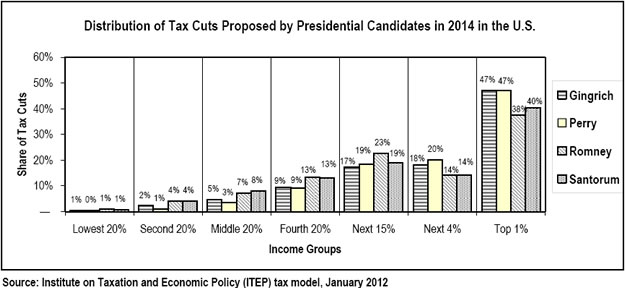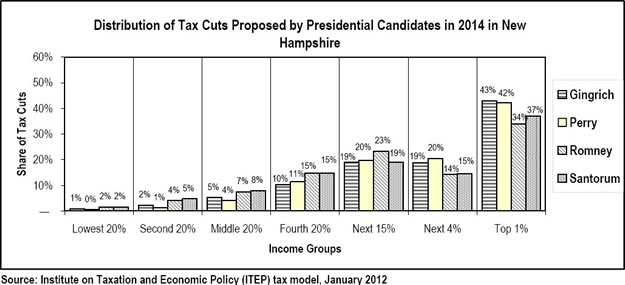Three months ago, CTJ’s Bob McIntyre told TIME that GOP candidate Mitt Romney likely has an effective federal tax rate of around 14 percent because of the tax break for investment income that Romney enjoys. Today, the candidate said, “What’s the effective rate I’ve been paying? It’s probably closer to the 15 percent rate than anything.”
 Romney went on to say, “Because my last 10 years, I’ve … my income comes overwhelmingly from investments made in the past, rather than ordinary income or rather than earned annual.”
Romney went on to say, “Because my last 10 years, I’ve … my income comes overwhelmingly from investments made in the past, rather than ordinary income or rather than earned annual.”
In other words, a wealthy person like Romney can receive most of his income in the form of capital gains and stock dividends, which are subject to a top rate of just 15 percent under the personal income tax and not subject to payroll taxes.
A CTJ report from last year explains that about one third of people with income in excess of $10 million annually get the majority of their income from investments and, because of these tax preferences, pay a lower effective tax rate than many middle-income taxpayers, who typically get their income from work. Romney is a member of this lucky group of wealthy individuals.
Ending the tax preference for capital gains and stock dividends is therefore the primary way to implement President Obama’s Buffett Rule, the principle that tax reform should reduce or eliminate those situations in which millionaires pay lower effective tax rates than middle-income people.
In Romney’s case, there is actually a very specific loophole that probably allows his income to be taxed as capital gains (taxed at the 15 percent rate) even when it is actually compensation for work. We call this the Romney Loophole, which allows wealthy fund managers to treat their “carried interest” (profits that they receive as compensation for their work) as capital gains and thus subject to the low 15 percent tax rate.
President Obama’s budget plans all contain a proposal to close the Romney Loophole, which would at least end the very worst abuse of the tax preference for capital gains and stock dividends. But to truly implement the Buffett Rule, the tax preference for investment income must be eliminated entirely.
 reflects a major dispute between corporate and labor leaders over tax reform. According to
reflects a major dispute between corporate and labor leaders over tax reform. According to  President Obama hosted an “Insourcing American Jobs Forum” last week with business leaders who are bringing jobs back to the United States. During the event, the President
President Obama hosted an “Insourcing American Jobs Forum” last week with business leaders who are bringing jobs back to the United States. During the event, the President  during last Saturday’s
during last Saturday’s  Massachusetts. The ad uses Romney’s support of user fees to question his anti-tax credentials because it says that user fees are essentially a “tax by another name.”
Massachusetts. The ad uses Romney’s support of user fees to question his anti-tax credentials because it says that user fees are essentially a “tax by another name.” candidates’ tax plans, includes a “territorial” system that would exempt the offshore profits of U.S. corporations from U.S. taxes. This is essentially a way to expand and consolidate the existing loopholes that encourage U.S. companies to shift their investments offshore.
candidates’ tax plans, includes a “territorial” system that would exempt the offshore profits of U.S. corporations from U.S. taxes. This is essentially a way to expand and consolidate the existing loopholes that encourage U.S. companies to shift their investments offshore.
 orm (heavily stacked with business interests), and low-income families would face the largest tax increases relative to their income. Upper-income families, by contrast, would enjoy a bonanza, with the richest one percent taking home over $2,800 in tax breaks per year.
orm (heavily stacked with business interests), and low-income families would face the largest tax increases relative to their income. Upper-income families, by contrast, would enjoy a bonanza, with the richest one percent taking home over $2,800 in tax breaks per year. policy proposals that are gaining momentum in states across the country. This week, we’re taking a closer look at proposals which would lessen a state’s reliance on progressive income taxes, often by shifting to a heavier reliance on regressive sales taxes.
policy proposals that are gaining momentum in states across the country. This week, we’re taking a closer look at proposals which would lessen a state’s reliance on progressive income taxes, often by shifting to a heavier reliance on regressive sales taxes.  Governor’s office, Steve Beshear is
Governor’s office, Steve Beshear is  free-market Oklahoma Council of Public Affairs is
free-market Oklahoma Council of Public Affairs is 
 Caucus the once unstoppable ethanol tax credit
Caucus the once unstoppable ethanol tax credit 




